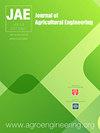Postharvest Physicochemical Quality Assessment of Greenhouse Produced Soilless Cucumbers in Relation to Differential Fertigation
IF 2.4
4区 农林科学
Q2 AGRICULTURAL ENGINEERING
引用次数: 0
Abstract
A study was undertaken to investigate the physico-chemical quality of cucumbers produced in soilless media under naturally ventilated greenhouse microclimatic conditions. The monitored microclimatic parameters included mainly air temperature, relative humidity and solar radiation. The air temperature varied in the range of 19.1-29.3°C and 22.6- 32.4°C during season 1 and season 2, respectively. Relative humidity varied in the range of 55.0-91.5% and 59.3-85.3% during season 1 and season 2, respectively. Solar radiation varied in the range of 80-147 W.m-2 and 97-172 W.m-2 during season 1 and season 2, respectively. The quality of cucumber was significantly affected by growing seasons, crop varieties, and fertigation levels. The vitamin C content, total phenolic content, and total chlorophyll content were significantly higher for PBRK-4 variety compared to Kafka and Multistar during both growing seasons, mainly due to varietal differences. Fruit firmness was also highest for PBRK-4 variety for both growing seasons at 100% level of fertigation. The vitamin C content, total phenolic content, antioxidant capacity, chlorophyll content, and firmness of cucumber fruit were in the range of 3.29-5.52 mg.100 g-1, 0.550-1,724 mg.100 g-1, 12.7-21.8%, 117.09-129.97 mg.100 g-1, and 30,960-34,030 gf, respectively. The partially controlled growing conditions helped in improving the physico-chemical quality of cucumber to a great extent compared to open field conditions.差异施肥对大棚无土黄瓜采后理化品质的影响
对自然通风温室小气候条件下无土栽培黄瓜的理化品质进行了研究。监测的小气候参数主要包括气温、相对湿度和太阳辐射。第1季和第2季的气温变化范围分别为19.1 ~ 29.3℃和22.6 ~ 32.4℃。第1季和第2季的相对湿度变化范围分别为55.0 ~ 91.5%和59.3 ~ 85.3%。第1季和第2季的太阳辐射变化范围分别为80 ~ 147w - m-2和97 ~ 172w - m-2。黄瓜的品质受生长季节、作物品种和施肥水平的显著影响。在两个生长季节,PBRK-4品种的维生素C含量、总酚含量和总叶绿素含量均显著高于Kafka和Multistar,这主要是品种差异造成的。在100%施肥水平下,PBRK-4品种的结实性在两个生长季节均最高。黄瓜果实的维生素C含量、总酚含量、抗氧化能力、叶绿素含量和硬度在3.29 ~ 5.52 mg之间。100 g- 1,0.55 -1,724 mg。100 g- 1,12.7 -21.8%, 117.09-129.97 mg。100 g-1和30,960-34,030 gf。与露天条件相比,部分控制的生长条件在很大程度上改善了黄瓜的理化品质。
本文章由计算机程序翻译,如有差异,请以英文原文为准。
求助全文
约1分钟内获得全文
求助全文
来源期刊

Journal of Agricultural Engineering
AGRICULTURAL ENGINEERING-
CiteScore
2.30
自引率
5.60%
发文量
40
审稿时长
10 weeks
期刊介绍:
The Journal of Agricultural Engineering (JAE) is the official journal of the Italian Society of Agricultural Engineering supported by University of Bologna, Italy. The subject matter covers a complete and interdisciplinary range of research in engineering for agriculture and biosystems.
 求助内容:
求助内容: 应助结果提醒方式:
应助结果提醒方式:


